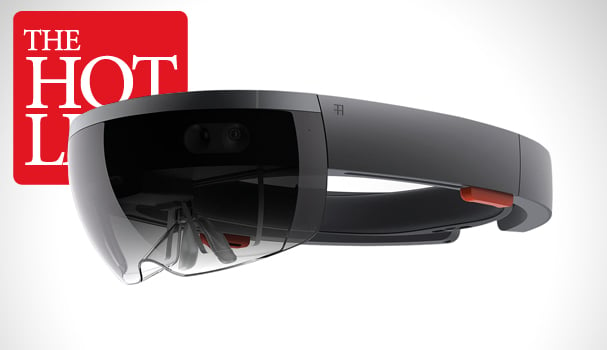HoloLens
Hardware
The totally immersive VR device Occulus Rift has attracted its fair share of imitators. But in creating HoloLens, Microsoft has decided to go in a decidedly different direction. The augmented reality goggles overlay graphics onto the real world, allowing users to interact with digital objects in three-dimensional space and break away from their screens. It seems to have almost limitless potential; whether you’re exploring digital content as real objects or playing augmented reality Minecraft, it’s very easy to get excited about its applications. Whilst Microsoft hasn’t had the best track record for innovations, HoloLens could be a real turning point.

Luna
Hardware
In combining our two favourite things – sleep and tech – the creators of the smartbed Luna have created an internet of things device we wouldn’t trade for all the smart thermostats and smoke detectors in the world. Luna warms your bed for you – allowing both you and your partner to independently set your preferred temperatures – tracks your sleep, comes with a smart alarm to wake you at the optimum point in your sleep cycle and will learn your patterns to better provide you with restful sleep. Truly a fatigued tech-fetishist’s dream.

YotaPhone 2
Hardware
Carrying around both an e-reader and a phone is a faff and yet reading books on your mobile is a hell of a drain on battery life. The original YotaPhone addressed this by introducing an e-ink screen on its reverse; a neat idea that was perhaps let down by the execution. The YotaPhone 2 has improved on this offering considerably; design-wise it has upped its game considerably, replacing its predecessor’s boxy grey frame with a sleek, rounded black and, as well as reading books, users can receive notifications and information on its e-ink display.

The Brand Deck
Hardware
Sometimes the best kind of tech is low tech. Given most start-ups spend a long time delineating the values and factors that define their brands, the Brand Deck presents a rapid-fire way of exploring what makes your brand what it is. It provides teams with a series of contrasting labels from experimental or traditional to simple or complex to place under headings of ‘you are’, ‘you are not’ or ‘N/A’. The makers have also collaborated with Max Temkin, the co-creator of Cards Against Humanity, to create a NSFW edition for founders to chuckle over when relaxing with a beer.

Embrace
Hardware
As we highlighted only last month, wearables get most exciting when they’re solving real world problems. Embrace is case in point. It does all the things one would expect – telling the time, tracking activity, monitoring sleep – and presents this in a way that runs deeper than wearables, usually geeky aesthetic; the square polished metal face and snap-bracelet-style strap are particularly nice touches. But its real strength is its ability to measure seizures in epilepsy sufferers, providing family members with either an alert on their mobile or haptic feedback to a linked Embrace, allowing them to provide immediate assistance. ![]()
Share via:


















































